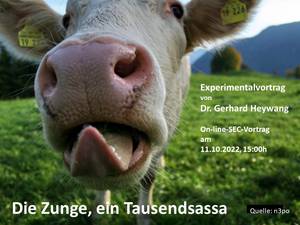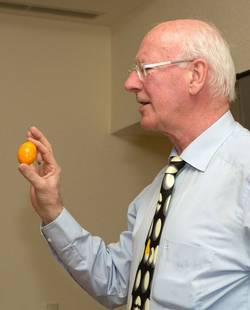

Moderation: Eva Wille
In the hour after waking, we humans are confronted with a multitude of chemicals and chemical products: usually in a very pleasant way! The experimental lecture sheds light on the many facets of chemistry in the morning.
By breakfast we've encountered water, plastics and toothpaste, which is OK, but also acetaldehyde, furfurylthiol and sotolon (components of coffee aroma). Surfactants, fragrances and dyes are allowed to act on the body and we try to get rid of them again using the bio-solvent water.

Presented by:
Wolfgang Gerhartz
The tongue is a very versatile organ. It helps with speaking, swallowing, chewing and many other activities in the mouth. The tongue is made up of 9 different muscles, each of which can only contract, but you can still stick the tongue out. How does that work? And how does it work when a chameleon can catapult its tongue out as long as its own body? What does a gummy bear taste like if you just put it on your tongue? Does salt always taste salty and isn't hot chili actually bodily harm? Who can roll their tongue? And what happens when you roll an R? All in all, it's about physics, biology and the chemistry in the mouth. The listeners are asked to have a gummy bear and a grain of salt ready.

Moderation: Eberhard Ehlers
Everyone has eaten an egg at some point – probably indulging in the pleasure without thinking about the interesting questions and useful answers that eggs hold.
The experimental presentation deals with aspects of eggs and answers questions such as: Why do you need a lot of water in the egg cooker for a few eggs and a little water for a lot of eggs? Why are eggs shocked? Which way does the egg come out of the chicken? Which chickens lay white eggs and which lay brown eggs? What is the coloring of brown eggs? How can you tell if an egg is boiled or raw? How long does it take a chicken to produce 8g of protein for the egg? How long does it take for the shell to form? Are chickens stupid or smart? And much more.
Did you like the lecture ? Or are you unable to attend the lecture ? Then write to Dr. Heywang by email; he will be happy to provide you with the slides from his lecture.
last modified: 11.07.2024 10:29 H from N/A